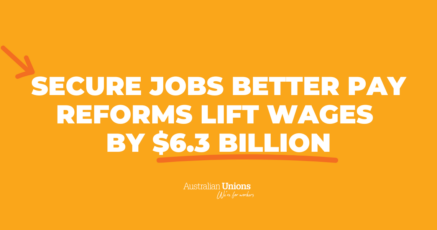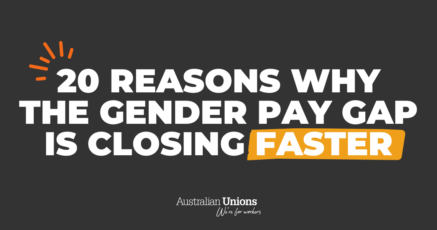In the last two years, the union movement has won the biggest changes to workers’ rights in Australia in generations.
But winning these new and improved rights is just the beginning: the best way to protect these rights is to use them and embed them for future generations.
And that’s exactly what union members are doing: using these newly-secured laws to secure better pay and conditions for thousands of workers, across workplaces and industries.
Here are just a few examples of how empowered workers are driving change.
15% pay rise for Early Childhood Education and Care workers
Just this month, Australian Education Union (AEU), Independent Education Union (IEU) and United Workers Union (UWU) members won a 15% pay rise for early childhood education and care workers on the back of a hard-fought-for campaign.
It’s a much-needed win for workers in this critical and traditionally-underpaid feminised industry.
The wage boost will roll out over two years, with workers on an average wage receiving a pay rise of $103 per week this year, increasing by a further $155 in December 2025. The increase comes with the condition that childcare centres must agree to cap fee increases to parents at 4.4% and must pass the full pay rise on to the workers.
This is a fantastic win not only for the workers, but also working families and society as a whole. Everyone benefits from more equitable and accessible early childhood education and care.
Over 28% pay rise for Aged Care workers
Union members won a wage rise of 15% for Aged Care workers in 2023 and followed that up with a further 13% rise in 2024 – adding up to an over 28% pay rise for some direct care workers in the industry. Personal care workers also saw an increase of between 18.2% and 28.5%.
This amazing result for a women-dominated and historically undervalued industry would have not been possible without the coordinated campaigning of members from the Health Services Union (HSU), the Australian Nursing and Midwifery Federation (ANMF) and the United Workers Union (UWU).
Members came together in their workplaces, the community, and online, highlighting the importance of their work and the impact they have on people in their care.
McDonald’s faces multi-employer bargaining push
Despite being the most profitable fast-food company in the world, McDonald’s only offers its staff award wage minimums, while denying workers a collective say in their pay and conditions.
Members of the retail and fast food union, the SDA, are using the new union-won multi-employer bargaining laws to push McDonald’s in South Australia to negotiate its first collective agreement in over a decade.
These laws mean union members can now bargain for – and win – better pay and conditions across workplaces or employers in the same industry. This historic move affects over 5,000 workers in South Australia and could impact stores nationwide.
Same Job Same Pay wins in the mining sector
New ‘Same Job Same Pay’ laws are based on the simple principle that workers who do the same job should be equally and fairly compensated. In practice, this means businesses can no longer force workers onto dodgy labour hire contracts to undermine pay and conditions.
The Mining and Energy Union (MEU) has already had two wins applying the new laws!
The first addresses the significant pay gap between directly employed workers and labour hire workers at Mount Pleasant coal mine in the Hunter Valley, NSW. The employer agreed to employ the labour hire workers directly, resulting in a pay rise of more than $30,000 and permanent jobs.
And hundreds of labour hire workers at Batchfire’s Callide mine at Biloela, Queensland are in line to get a pay rise from 1 November, when their pay must be lifted to match rates under the Enterprise Agreement that covers permanent employees. Some workers are set to receive up to an extra $20,000 per year.
More union action is underway currently in the Pilbara region of Western Australia, with unions this week using the new laws to force BHP – one of Australia’s largest mining companies – to negotiate a new collective bargaining agreement.
These kinds of cases set a powerful precedent for other labour hire workers to also be paid fairly and win secure, permanent jobs.
Be a part of winning change
It’s a great time to be a union member.
The scale and significance of the new and improved rights show what union members can achieve when we campaign and have a Labor government in power, ready and willing to support working people.
After a decade of deliberate wage suppression under former coalition governments, the dial is finally shifting and wage growth is heading in a positive direction again.
In fact, real wages from 2023-24 have grown by the same amount as the total over nearly 10 years of the previous Coalition government.
The more union members we have organising in workplaces around the country, the better deal we can secure for all workers.







SHARE:
Using new laws to win better pay and conditions for working people